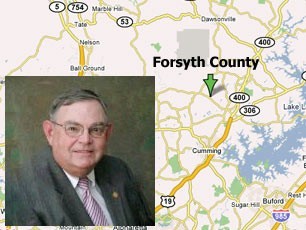The state Department of Family and Children Services said that in October 2007, 1,038 households in the county used food stamps. By October of this year, that number had jumped to 2,452.
John Will, the owner of Fergusons Meat Market, about five miles from Cumming, said his business only began accepting food stamps about four months ago. And it did so because of demand.
"We never accepted them before, and frankly didn't have a lot of demand," said Will, whose store has long been a destination for locals seeking custom cuts of meat. "Now, there are people calling every day who want to know if we take them."
The number of county residents using food stamps is still relatively small, only about 3 percent of its population. In Fulton County, 14 percent of the population gets food stamps. In DeKalb, the figure is 13 percent. It's 8 percent in Gwinnett and 7 percent in Cobb.
Officials point out that some of the jump in Forsyth can be attributed to population growth. The county grew from about 150,000 residents in 2007 to about 168,000 by 2008.
But there are other factors, and they confirm that even the most affluent areas feel the sting of severe downturns like this one.
Just a year ago, the U.S. Census' American Community Survey reported that Forsyth had the highest median household income of any county in Georgia about $88,600. The New York Times, meanwhile, recently published a story that indicated Forsyth had the 13th-largest increase (on a percentage basis) in the nation since 2007 of residents receiving food stamps.
Glynn Jenkins, a spokesman for Kroger, said the supermarket chain's Forsyth-area stores have seen a jump in food stamp usage. He attributed the increase to "the nation's weakened economy and rise in unemployment rates."
Food stamps are not only intended for low-income households, but are also available to those who are in a temporary financial crisis due to job loss or other duress.
Cumming City Manager Gerald Blackburn said that just a few years back, the county had an unemployment rate of about 3 percent. The jobless rate had climbed to 8.7 percent in October, with 7,081 people unemployed.
The state rate is 10.2 percent.
"This was an area where the housing boom was a big deal," said Blackburn, who has been in his job for two decades.
"Everybody who wanted a job could get one. There was a lot of construction work everywhere. But that's just not the case anymore," Blackburn said.
No one knows that better than Don Barrett, a branch manager for Lummus Supply Co., which has five locations around metro Atlanta to provide custom home builders with construction supplies.
This past summer, the company shuttered its Cumming store as demand sank along with the county's housing boom.
"There was just no new construction going on," he said. "There was not enough activity to support the location up there."
Construction of custom-built homes along the shores of Lake Lanier was "going gangbusters" until 2007 or so, he said. It began to taper off, then collapsed as credit tightened and the economy began to skid.
"It got to the point where the builders could not borrow any money," he said. "If they can't borrow, they can't build."
Charles Laughinghouse, chairman of the Forsyth County Board of Commissioners, said the county's economic challenges are like those of its counterparts across the metro region.
"While overall I think we may be faring better than some, we have seen a decrease in development activities within the county," Laughinghouse said.
Kathy Huggins, a cashier at Fergusons Meat Market, said she has seen plenty of anecdotal evidence of the downturn while ringing up groceries in the store, which is decorated with portraits of the late John Wayne and stuffed critters ranging from a beaver to a coyote.
"Of those that come in here (with food stamps), maybe 10 percent or less are low-income folks," she said.
"Most are people who had good jobs and lost them. One guy was a mortgage broker. Most of them were in construction, builders and hard-working people like that."
The plastic debit card used for the government-paid food coupon program makes many of its new users noticeably uncomfortable, Huggins said.
"They don't like to show them," she said. "They are embarrassed by it. I tell them they don't have anything to be ashamed of. A lot of people are using these for the first time in their life."

Charles Laughinghouse, chairman of the Forsyth County Board of Commissioners, said the county's economic challenges are like those of its counterparts across the metro region.
http://accesswdun.com/article/2009/12/211956
